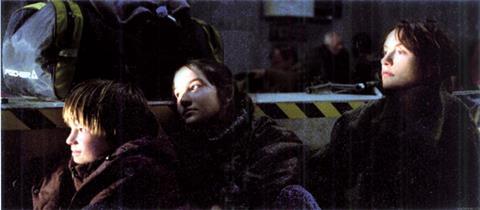Dir: Michael Haneke. France-Austria. 2003. 113mins

Since Michael Haneke devotees are taking the imminence of an inevitable apocalypse for granted, it is only natural to expect from him a grim prophecy on the state of the world after that ominous event occurs. The title, taken from an ancient German poem, refers to the time just before the end of the world, and it does not really matter what will determine this end.
What does matter is how the human race reacts to it. Haneke, whose films have never been an easy sell but have established in the past a solid following on the arthouse circuit, shows again his mastery in the visual department but fails to match it with a suitable script, delivering a picture that is less disturbing, driven and focused than his best efforts. After his triumph two years ago on the Croisette with The Piano Teacher, his name, combined with that of Isabelle Huppert, may open all the right doors for this new effort, which screened out of competition - but it is not certain that they will stay open for long.
Huppert starts strongly as the woman who has to manage her children’s survival after her husband’s murder, but she gradually fades away into the choral structure of the plot
The first 15 minutes of the film are among the most astounding achievements of his career. A man (Duval), his wife (Huppert) and their two children, an older girl (Demoustier) and a younger boy (Biscombe), drive from the city to their country home to seek refuge from an unnamed calamity that has just broken out. But they find the house occupied by armed squatters, the man is shot, his wife and children are allowed to escape, though they have nowhere to go and no door in the nearby village, already wrecked by the events, will open for them.
When they stop for the night in an isolated barn, the boy suddenly disappears, and the terrified mother and daughter try to find him in the midst of the dark, foggy, silent and unfriendly night. Up to this point, Haneke holds his own magnificently, using a spare, economical, precise visual language to put his audience in an almost immediate state of anguish, brilliantly exploiting the potential of the wide screen, with some astonishing night shots, particularly one in which the image is completely dark with the exception of one bonfire, seen from great distance, in a corner of the screen.
But once he starts introducing more characters into the picture - first a kind of nature boy who is a natural survivor, then more refugees, among them strangers who speak no French, all stranded in a train station and hoping for a means of transportation that will take them to a better place, though there is no certainty such a place exists - the picture starts losing its drive, the magic is dispelled and more predictable elements are introduced one after the other. The inexorable sequence of events in the opening is diluted into far too many secondary plots and remarks. Haneke also serves his familiar cautionary brew: hate of strangers, exploitation of the weak, adults perverting the innocence of their children, humans contaminating nature and a Beethoven sonata barely heard as the one redeeming factor of the past.
Messianic notions, on the one hand, and fascist threats, on the other, are never far away. If there is one change, it is an almost imperceptible move towards more humane, and away from extreme, human conduct of his past films. Although the whole thing is supposed to take place in the future, there is nothing to indicate that this is not the present, one more tip that we are already living the future predicted by the film.
Powerful images sometimes relieve the conventionality of the situation, the majesty of nature desecrated by the cold atrocities of human hands. But as more and more characters are brought in, and as it becomes evident that Haneke does not intend to take anyone anywhere - for there is nowhere to go - the interest in what is happening on the screen quickly wanes. The biggest disappointment comes in the closing shot, which offers an inconclusive ending that is not much more than a cop out to an inconclusive plot.
Huppert starts strongly as the woman who has to manage her children’s survival after her husband’s murder, but she gradually fades away into the choral structure of the plot. Others in the cast - including at least three film directors in their own right: Patrice Chereau, Brigitte Rouan and Daniel Duval - are also under-utilised. Finally, one wonders whether the decision to call the Romanian refugees ‘Polish’ was an error of the script or just a means to express a general xenophobia that treats all the ‘aliens’ alike, never mind where they come from.
Prod co:Les Films du Losange, Wega Films
Int’l sales:Les Films du Losange
Prods:Margaret Menegoz, Veit Heiduschka
Scr:Haneke
Cinematography:Juergen Juerges
Ed:Monika Willi, Nadine Muse
Prod des:Christoph Kanter
Main cast:Isabelle Huppert, Maurice Benichou, Lucas Biscombe, Patrice Chereau, Beatrice Dalle, Anais Demoustier, Daniel Duval, Olivier Gourmet, Rona Hartner, Brigitte Rouan, Hakim Taleb, Maryline Even

























No comments yet